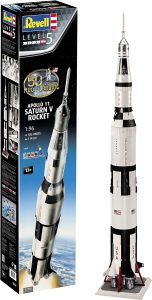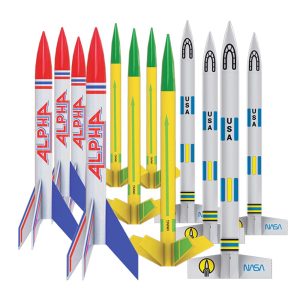Imagine soaring to new heights with your very own model rocket, a marvel of precision engineering and aerodynamic design. Welcome to the world of multistage model rockets, where the boundaries of innovation and excitement are pushed to the limit. Whether you're a seasoned enthusiast or just starting out, this comprehensive guide will walk you through the intricacies of designing and building your own multistage model rocket, complete with expert tips, tricks, and resources to help you reach for the stars.
Quick Links to Useful Sections
What Are Multistage Model Rockets?
Multistage model rockets are a type of rocket that uses two or more separate stages to propel a payload into the air. Each stage is designed to burn out and separate from the previous one, allowing the next stage to ignite and continue the ascent. This design enables model rockets to reach higher altitudes and carry heavier payloads than single-stage rockets.
Multistage model rockets are not only more complex and challenging to build, but they also offer a more realistic and exciting experience, mimicking the real-life rockets used in space exploration.
The Benefits of Multistage Model Rockets
So, why go multistage? Here are just a few benefits of building and flying multistage model rockets:
- Increased Altitude: With multiple stages, you can reach higher altitudes and experience the thrill of watching your rocket soar to new heights.
- Improved Payload Capacity: Multistage rockets can carry heavier payloads, allowing you to experiment with different components and accessories.
- Enhanced Realism: Multistage model rockets provide a more realistic and immersive experience, simulating the real-life rockets used in space exploration.
- Challenging and Rewarding: Building and flying multistage model rockets presents a fun and challenging project for enthusiasts of all levels.
Designing Your Multistage model rocket
Before you start building, it's essential to plan and design your multistage model rocket. Here are some key considerations to keep in mind:
Looking For The Best Model Rocket Kits? You'll Love These:
- Choose Your Stages: Decide on the number of stages you want your rocket to have, and select the appropriate motors and components.
- Select Your Materials: Choose lightweight, durable materials for your rocket's body, fins, and other components.
- Plan Your Electronics: Decide on the type of electronics you'll need, such as altimeters, GPS, and recovery systems.
- Consider Safety: Always prioritize safety when designing and building your model rocket, ensuring that it meets all safety guidelines and regulations.
Building Your Multistage Model Rocket
With your design plan in place, it's time to start building your multistage model rocket. Here are some tips and techniques to help you get started:
- Use High-Quality Components: Invest in high-quality motors, electronics, and other components to ensure reliable performance.
- Assemble with Care: Take your time when assembling your rocket, ensuring that all components are securely attached and aligned.
- Test and Refine: Conduct thorough testing and refinement to ensure that your rocket is stable, reliable, and ready for flight.
Flying Your Multistage Model Rocket
The moment of truth has arrived – it's time to launch your multistage model rocket! Here are some tips to help you get the most out of your flight:
- Choose a Safe Launch Site: Select a safe, open area with minimal wind and obstacles.
- Conduct a Pre-Flight Check: Ensure that all components are functioning correctly, and your rocket is ready for launch.
- Launch and Recover: Launch your rocket, and use a recovery system to retrieve it safely after flight.
Resources and community Support
Building and flying multistage model rockets can be a challenging and rewarding hobby, but it's even more fun with the right resources and community support. Here are some valuable resources to get you started:
- Model Rocketry Forums: Join online forums and communities to connect with other enthusiasts, share knowledge, and learn from experts.
- Tutorials and Guides: Find step-by-step tutorials, guides, and videos to help you design, build, and fly your multistage model rocket.
- Local Clubs and Meetups: Connect with local model rocketry clubs and meetups to meet fellow enthusiasts, share knowledge, and learn from others.
Frequently Asked Questions
Here are some frequently asked questions about multistage model rockets:
1. What is the highest altitude a multistage model rocket can reach?
The highest altitude a multistage model rocket can reach depends on various factors, including the type of motors used, the rocket's design, and the atmospheric conditions. However, with advanced designs and motors, it's possible to reach altitudes of over 10,000 feet.
2. How do I ensure my multistage model rocket is stable and reliable?
To ensure stability and reliability, it's essential to design and build your rocket with precision, using high-quality components and materials. Conduct thorough testing and refinement to identify and address any issues before flight.
3. What safety precautions should I take when building and flying multistage model rockets?
Always prioritize safety when building and flying model rockets. Ensure that you follow all safety guidelines and regulations, and take necessary precautions to avoid accidents and injuries.
Looking For The Best Model Rocket Kits? You'll Love These:
Useful Interruption: Dive deeper into the world of Model Rockets with our most popular sections. If there is anything you think is missing or anything you would love for us to write about, just give us a shout.
- Getting Started & Basics With Model Rockets
- Model Rocket Design, Build & Customization
- Model Rocket Propulsion & Engine Technology
- Model Rocket Launch Techniques & Recovery
- Model Rocket Advanced Rocketry & Innovations
- Model Rocket DIY and Customization
- Model Rocket Equipment Reviews & Digital Tools
- Community, Competitions & Education
- Model Rocket Troubleshooting & FAQs
- Model Rocket Bonus/Seasonal & Niche Topics
A group of model rocket enthusiasts gathered at a field for their weekly launch event. Among them was Dave, a seasoned builder known for pushing the limits of hobby rocketry. This time, he had outdone himself.
“Ladies and gentlemen,” Dave announced, dramatically pulling a cloth off his latest creation, “I present to you: The Kraken!”
The crowd gasped. This wasn’t just a model rocket, it was a monster. The thing stood 8 feet tall, had six clustered engines, and was covered in enough duct tape to qualify as a classified aerospace project.
“Dave,” muttered Steve, the cautious safety officer, “Have you, uh… done the math on this?”
“Math?” Dave scoffed. “I built it in my garage at 3 a.m. with parts from eBay. This is an art piece, Steve.”
The countdown began.
5…
4…
3…
2…
1…
The engines ignited with a BOOM, and The Kraken shot up… kind of. It immediately did a violent barrel roll, narrowly missing the spectators before skyrocketing at an angle that could only be described as “legally questionable.”
The crowd collectively ducked as The Kraken flew straight over the adjacent cornfield, where Old Man Jenkins, the grumpiest farmer in town, was minding his business.
KABOOM!
The rocket disappeared behind the barn. A moment later, a flaming piece of Estes igniter wire landed at Steve’s feet. The silence was deafening.
And then, an unmistakable sound echoed across the field.
Jenkins’ shotgun being cocked.
“DAVE!!!” Steve shouted. “RUN.”
And that was the day Dave invented the first-ever biologically powered rocket booster: pure adrenaline.
To this day, nobody knows where The Kraken landed, but legend has it, it still haunts the skies, terrifying unsuspecting drones and low-flying birds.















